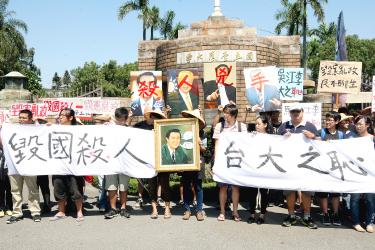In the wake of the Chinese Nationalist Party’s (KMT) decision to postpone its party congress that was scheduled for Sunday due to protests planned against President Ma Ying-jeou (馬英九), a group of protesters from labor unions and civic groups yesterday protested outside the KMT headquarters, accusing Ma of evading public discontent and urging the party to address political strife.
Shouting: “Face the misery of the people, Ma Ying-jeou. Four KMT star politicians, stop blurring the line between right and wrong,” the protesters accused Ma and Legislative Speaker Wang Jin-pyng (王金平) of worsening living conditions for the public amid their political rift, and urged Ma’s possible successors — Vice President Wu Den-yih (吳敦義), Premier Jiang Yi-huah (江宜樺), New Taipei City (新北市) Mayor Eric Chu (朱立倫) and Taipei Mayor Hau Lung-bin (郝龍斌) — to resolve the issue for the sake of their own political futures.



 The News
The News








